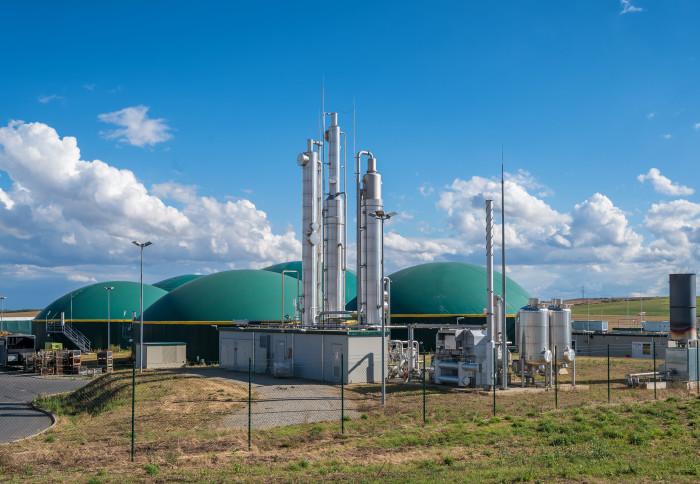Biogas emissions could risk Net Zero targets, a recent study warns
by Gemma Ralton

Scientists have measured methane emissions from UK biogas plants and warn that robust monitoring is needed to meet national sustainability targets.
In a pioneering study, scientists monitored methane emissions from ten UK biogas plants and found that they could account for up to 3.8% of the country’s total methane emissions.
The researchers warn that without rigorous monitoring and clear guidance, biogas emissions risk the UK not meeting its UK Net Zero targets.
The study is published in Waste Management.
Methane (CH4) is the second largest greenhouse gas produced by human activity and is a powerful climate warmer, trapping 32 times more heat than carbon dioxide.
“We need robust, consistent emission measurements, new technologies and legal requirements to be put into practice soon.” Semra Bakkaloglu Sustainable Gas Institute
Despite efforts taken to reduce global greenhouse gases, methane emissions continue to rise largely due to the growing use of biogas as a renewable energy resource.
The problem requires finding, identifying, and quantifying sources of methane throughout the globe – a key objective of the recent study.
After observing methane emissions from agricultural farm and food waste plants, the study concluded that the UK Net Zero Commitment may be jeopardised unless robust consistent emissions measurements and legal requirements are put into practice in the near future.
Biogas: A source of methane and of renewable energy
Biogas refers to a waste management technique that produces gas from the anaerobic digestion of organic matter, predicted to cover nearly 20% of worldwide gas demand which can be converted into electricity, heat or transport fuels.
Broadly speaking, biogas plants can be filtered into three different categories: agricultural farm (plants that use agricultural feedstock such as manures, slurries, and crop residues), food waste (plants that use commercial and industrial waste) and sewage sludge.
Despite offering a promising renewable energy supply, biogas plants can also be the source of significant methane emissions. Fugitive methane can leak from various sources at plant sites, including from feedstock storage tanks, gas safety valves, gas storage units, and other pipework.
Additionally, the UK National Atmospheric Emissions Inventory suggests that in 2018 nearly 37 per cent of methane emissions in the UK came from the waste sector, 14 percent higher than the European Union average of 23 per cent.
In recent years, more waste has been diverted to alternative treatments such as biogas plants and less has been landfilled. As production of renewable energy from biogas plants continues to grow in the UK, the challenge is now to successfully monitor, quantify and reduce fugitive emissions in line with sustainability commitments.
A mobile measurement study
Researchers conducted mobile greenhouse gas surveys in southern England between 2018 and 2020.They measured methane fractions using an established technique for gas sensing known as cavity ring-down spectrometry.
The study used a downstream quantification approach to help determine overall emissions rates from 10 biogas plants by carrying out sampling on roads outside the plant sites themselves, detecting methane plumes downwind of the source.
Results showed that methane emissions varied between 0.1 and 58.7 kilograms per hour, with small farm biogas plants emitting higher amounts of methane compared with larger food waste biogas plants. Percentage of methane losses relative to the calculated production rate ranged from 0.02 to 8.1%.
Moreover, it was suggested in the study that biogas methane emissions may account for up to 3.8% of total methane emissions in the UK and therefore the measured emissions rate could be significantly larger than the inventories suggest.
A step forward for Net Zero targets
The research represented the first biogas plant mobile measurement study to estimate methane emission rates in the UK in line with the Horizon 2020 project MEMO².
MEMO², also known as MEthane goes MObile, is a European Training Network with more than 20 collaborators from seven different countries, working to identify and evaluate methane emissions and support mitigation measures by educating a new generation of “cross-thinking” scientists.
According to lead author Semra Bakkaloglu, of the Sustainable Gas Institute: “Waste management practices are changing to support meeting the commitments to Net Zero emissions, and more waste will be sent to biogas plants to divert it from landfill. Therefore, we cannot ignore the methane emissions from the biogas plants, which may jeopardise the sustainability of biogas plants and the UK Net Zero Commitment.
“We need robust, consistent emission measurements, new technologies and legal requirements to be put into practice soon.”
Next steps
The team suggests that biogas plant emissions should be monitored on a daily basis in order to determine how emissions vary depending on site activities and meteorological variations, with more strict legal requirements.
Repeated surveys with site access and full cooperation with biogas plant operators are recommended for more detailed future studies.
It is recommended to use 2D-3D anemometers at fixed sites in the plumes for future studies to minimise uncertainties.
As part of the Sustainable Gas Institute’s Methane Group at Imperial College London, Dr Semra Bakkaloglu is carrying out further investigations of methane emissions and mitigation strategies to represent a key development towards national sustainability targets.
-
‘Quantification of methane emissions from UK biogas plants’ by Semra Bakkaloglu et al is available in Waste Management.
The research was carried out as part of Semra Bakkaloglu’s PhD at the Department of Earth Sciences at the Royal Holloway University of London, supervised by Dr Dave Lowry and Dr Rebecca Fisher. It represents a collaborative effort between researchers from Imperial College London, Royal Holloway, University of Cambridge, Swiss Federal Laboratories for Materials Science and Technology and University of Groningen.
Main image: Shutterstock
Article text (excluding photos or graphics) © Imperial College London.
Photos and graphics subject to third party copyright used with permission or © Imperial College London.
Reporter
Gemma Ralton
Faculty of Engineering